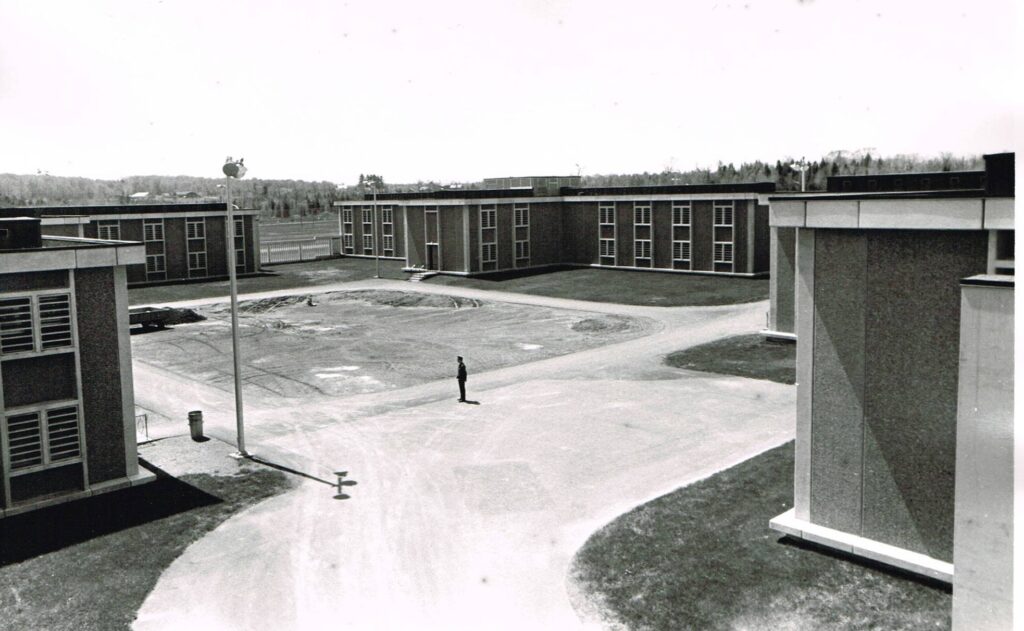Heartbreak Special
“We emphasized this service to connect families who didn’t have the financial means or abilities to stay in touch with other family members inside the penitentiary,” Doran said, adding, “We would bring the wife and kids.”
Tom Doran recalls a humorous, if unnerving, incident occurring in the auditorium of Millhaven Penitentiary near Kingston in 1973. The Quarter Century Club consisted of inmates serving prison sentences of twenty-five-plus years. As a co-director at Operation Springboard, Doran was responsible for scheduling speakers to provide talks, inviting prominent lawyers, politicians, and journalists to address the unique group of inmates. While the presenter spoke, a rifle-toting guard perched in a metal cage isolated ten feet above the tiled floor watched the half dozen or so hardened criminals. The guard routinely rested the rifle barrel on the edge of a small opening in the mesh, ready to put down threatening behaviour with the pull of the trigger.
Halfway through a talk one afternoon, the speaker was interrupted by a metallic crash below the guard’s perch. Unbeknownst to the startled assemblage engrossed in the presentation, the guard had dozed off and lost his grip on the loaded rifle, which fell into the auditorium with a crash. Convicts stared in disbelief at the firearm within arm’s reach on the floor. “Nobody knew what to do,” Doran remembers, “There was dead silence for about a minute, then everyone broke into laughter. Nobody was going to pick up the gun.”
Tom Doran was in his early thirties when he shared the co-director position with Douglas MacLaurin. Previously, Doran had been a schoolteacher. He started working at the agency when it was still in its infancy. In his co-director role, Doran organized programs such as Millhaven’s Quarter Century Club and supervised transportation services for family members of inmates visiting loved ones incarcerated at five federal institutions in the Kingston area, plus the Prison for Women across the road from Kingston Penitentiary.
Springboard, operating on a shoestring budget from the second floor of a dilapidated old Victorian home at 297 Carlton Street, also provided job counselling, accommodations, legal referrals, and family support for ex-offenders. Sponsored by the Toronto Christian Resource Centre, the agency made significant progress in three short years but struggled financially during Doran’s tenure, scraping by on Local Initiatives Program grants, or LIP grants, a federal program that funded cultural projects and community programs. Doran and the small pool of staff each grossed $100 per week from the grant. A cadre of volunteers also pitched in.

Operation Springboard originated in 1969 when three inmates at Warkworth Institution, Donald Bailey, Edward Laboucane, and Richard Carter, conceived the idea for the agency. Carter, 28, was serving a four-year sentence for auto theft, breaking and entering, and passing bad cheques. Laboucane, 29, was in for fraud, forgery, and false pretense. Bailey, 27, was a convicted bank robber.
At various stages of their incarceration, the trio discussed the impact imprisonment had on their families. Their marriages were failing, and they were estranged from their children. For spouses residing a distance away in Toronto, the financial means to pay for transportation to the institution were unavailable, and even if they could afford the trip, visitations were limited to one per month. While in prison, Bailey’s wife visited twice, and Laboucane’s four times. Carter’s wife filed for divorce while at Warkworth.
Despite their circumstances, they showed remarkable foresight, laying the foundation for a service that would later benefit countless others.
Bailey was released in the summer of 1969, and Laboucane was paroled in the spring of 1970. Carter’s release came two years later. By then, their marriages had ended, and they lived in Toronto’s Cabbagetown neighbourhood. True to their word, they paired up with the Christian Resource Centre, received an Atkinson Foundation grant, bought a station wagon, and arranged for volunteer drivers to transport mothers, wives, and children of inmates to visit incarcerated loved ones.
Springboard transported over 1,600 relatives on visitations in its first year of operation. Distance travelled totalled about 2,000 miles a week. Doran said that husbands and fathers were often imprisoned. “We would bring the wife and kids to the penitentiary.”
“We emphasized this service to connect families who didn’t have the financial means or abilities to stay in touch with other family members inside the penitentiary,” Doran said, adding, “We would bring the wife and kids.”
When Tom Doran was hired in 1973, Springboard had expanded its services and acquired a bus. Doran spent much time driving between Toronto and Kingston, making five roundtrips weekly.
“We emphasized this service to connect families who didn’t have the financial means or abilities to stay in touch with other family members inside the penitentiary,” Doran said, adding, “We would bring the wife and kids.”
The daily bus service became known as the Heartbreak Special.
During the drive, children fidgeted or dozed off while their mothers in below-the-knee skirts or denim bellbottoms paired with ankle boots and feathered bangs remained lost in thought, gazing at the passing highway landscape. Others were cheerful and talkative. When the bus arrived at the prison gate, a guard confirmed visitors’ names against their list, made a phone call, and the gate swung open. Wives adjusted their clothing and fixed their makeup. Youngsters became excited and anxious. Quietly entering a reception building full of tables and padded plastic chairs, they took their seats, and then convicts filed in, looking for a familiar face.
Visits were the highlight of the week or month for many inside. The reception building became a cacophony of laughter, crying, arguing, hushed conversations, or shouting matches. Despite challenges, this dedication to maintaining familial connections underscored the profound impact of Operation Springboard’s services.
Early on, it occurred to Doran that instead of sitting idly on the bus reading the newspaper in the parking lot during visitations, entering the institution and counselling inmates would be more productive. “Guys inside became institutionalized. Their lives were really regulated.” Instructed when to get up, what to eat, when to eat, and when to retire to bed, Doran observed, “Do that for five years, and you certainly became institutionalized.”
Doran suggested methods to avoid or at least diminish the impact of a regulated life. “It seemed to work a bit. Some came out and had good relations with their families while others were estranged.” Inmates trusted Springboard because individuals with similar life experiences initially established the organization.
After their release, Doran said Springboard would maintain a relationship with the inmate, who was obliged to live in a halfway house. “We had contact with their parole officers, too.”
Of Springboard’s early accomplishments, Doran is proud of its involvement with the Quarter Century Club. In addition to Springboard establishing inmate committees in each of the five federal institutions, Doran became the outside representative for lifers at Millhaven, scheduling presenters to address the group. “There wasn’t a lot of programming inside, so they really enjoyed me bringing in speakers. I got some pretty high-profile speakers.”
Black inmates desperate for similar representation also approached Doran to be their voice on the outside, but his efforts failed to get traction.
On the second Saturday in September 1973, the Quarter Century Club expressed appreciation by hosting a barbeque honouring Operation Springboard’s work. The gathering in the auditorium included the warden, his deputy, some criminal lawyers, Queen’s University professors, the local MP, a contingent from Operation Springboard, and members of the press. The keynote speaker that day was Arthur Maloney, one of Canada’s most highly regarded criminal lawyers, a former Member of Parliament largely responsible for drafting the Canadian Bill of Rights in 1960.
“There were those among us who really did an awful lot of work. A lot of good work.”
After his talk concluded, members of Operation Springboard were lauded and given certificates of appreciation. Then, everyone migrated outside to a fenced-in grassy area to enjoy a barbeque. Someone played a guitar.
By 1975, Doran was experiencing job burnout. In addition to repeated trips back and forth along Highway 401, his position also included administrative responsibilities. Conflict arose among staff, with some wanting to take the agency in a different direction. Doran resisted. “I wanted to stick to the original mandate of keeping families together.”
Work took a toll on his health, compounded by the financial strain of low wages. “I was really involved with Operation Springboard and didn’t want to leave.” Around his departure, the agency became incorporated, receiving not-for-profit status. After Springboard, Doran worked as a probation officer before establishing a long career with Canada Post.
Eighty-two years old today, Tom Doran relishes his experience at Operation Springboard and is proud of the work accomplished. “There were those among us who really did an awful lot of work. A lot of good work.”

